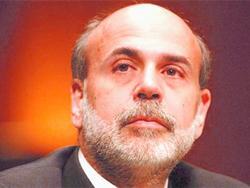Fed Chairman Bernanke Says Recession Likely Over
Washington, DC, Sept. 16, 2009--Federal Reserve Chairman Ben Bernanke said Tuesday the recession is probably over.
However, he said that although the economy is growing, it will still feel like a weak economy for some time, much of it due to high unemployment.
Bernanke said the economy likely is growing now, but he warned that won't be sufficient to prevent the unemployment rate, now at a 26-year high of 9.7 percent, from rising.
"From a technical perspective, the recession is very likely over at this point," Bernanke said in responding to questions at the Brookings Institution. "It's still going to feel like a very weak economy for some time because many people will still find that their job security and their employment status is not what they wish it was."
The recession, which started in December 2007, has claimed a net total of 6.9 million jobs.
With expectations for a lethargic recovery, the Fed predicts that unemployment will top 10 percent this year. The post-World War II high was 10.8 percent at the end of 1982.
Some economists say it will take at least four years for the jobless rate to drop down to a more normal range of 5 percent.
Even if the economy logs "moderate" growth in 2010, unemployment is likely to stay elevated, Bernanke suggested.
"Unfortunately, unemployment will be slow to come down. It will come down but it may take some time," he said. "Obviously, that's a very serious concern."
Analysts predict the U.S. economy is growing in the current quarter, which ends Sept. 30, at an annual rate of 3 to 4 percent. It shrank at a 1 percent pace in the second quarter, much slower than in previous quarters.
Bernanke said the economy is coping with "ongoing headwinds," including hard-to-get-credit for consumers and businesses, and households saving more, spending less and trimming their debt. Those forces can weigh down the recovery, he said.
Other analysts worry that falling house prices could hamper the broader rebound, especially if they cause consumers to tighten their belts.
